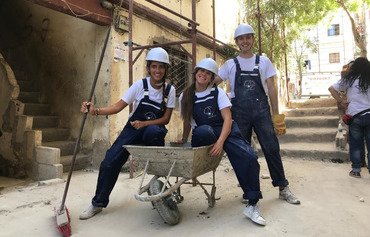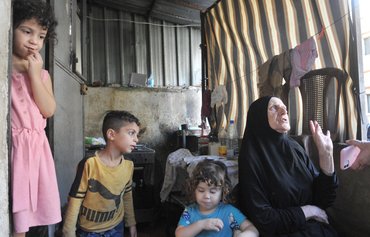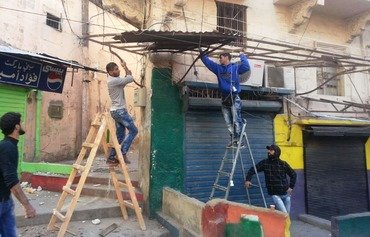Two young men from rival neighbourhoods in Lebanon's northern city of Tripoli took part in years of sectarian violence that left much of the two areas destroyed.
Eventually, however, after years of enmity, Ali Amoun, 23, of Jabal Mohsen, and Atris Samir Hussein, 26, of Bab al-Tabbaneh cast their weapons aside and established a strong friendship.
Today they and other former combatants are working to rebuild parts of the historic gold market they destroyed, swapping their rifles for building tools.
Amoun and Hussein are among the hundreds of young men in Tripoli who engaged in the rounds of fighting from 2007 to 2014 between largely Alawite Jabal Mohsen and majority Sunni Bab al-Tabbaneh.
Tensions increased between the two districts with the onset of the war in neighbouring Syria, and battles between them grew intensely fierce until Lebanese forces implemented a security plan in early April 2014.
As soon as the sound of gunfire fell silent, several groups launched initiatives to bring about reconciliation , including one launched by the MARCH organisation, which has made significant headway in this regard.
"I took part in all the rounds of fighting against Bab al-Tabbaneh, then found, when I joined the activities of the MARCH organisation, that they are not terrorists," Amoun told Al-Mashareq.
The process of reconciliation "began early in 2015 with a theatre workshop that brought together 16 former combatants", he said.
"We transcended our friction and reconciled, and I built strong friendships with the inhabitants of Bab al-Tabbaneh, where I spend most of my time," he said.
'A model of genuine reconciliation'
"Today I work at Kahwetna café (Our Café), which was opened by the organisation and, by virtue of its location at the battle line on Syria Street, has consolidated the reconciliation with its purposeful cultural and artistic activities," he said.
Amoun, an electrician, now oversees a work group of 10 former combatants who are helping to rebuild the city's gold market, removing all traces of the conflict and sending a positive message to the community and world.
"Our hearts are purified, and we are connected by a friendship that will not allow us to be drawn into armed conflict anymore, because we have come to realise its negative consequences," Amoun said.
"Our reconciliation is a model of genuine reconciliation," he said.
His friend Hussein, of Bab al-Tabbaneh, told Al-Mashareq that he used to view Jabal Mohsen residents "as terrorists who must be eliminated".
"My view of them has changed since, thanks to the MARCH organisation," he said. "We turned from enemies to friends, and now exchange visits and create occasions to meet."
"I realise today that we are alike, even in our problems and our worries," he added. "We were raised as enemies, but the common denominator between us was unemployment, which was the reason we took up arms."
"I used to meet Jabal Mohsen fighters in prison, and now we meet at the Kahwetna café," Hussein said.
"Together we are rebuilding what we destroyed with our hands in the gold market, and we are doing so hand-in-hand to consolidate our reconciliation that we will never relinquish," he said.
Hussein, a painter, said he is restoring the bright colours to the shops as a way to "restoring life for us".
Positive interactions, constructive ideas
MARCH director Lea Baroudi told Al-Mashareq that for the past two years the organisation has been forging "reconciliation between former combatants in Bab al-Tabbaneh and Jabal Mohsen in Tripoli by creating space for interaction".
Young people are encouraged to take part in positive interactions instead of "loitering in the streets and falling into drug use", she said.
"We started with 16 young men and women and today more than 200 have reconciled and become friends," she said. "We brought them together in art workshops and theatrical plays in which they explored their reality and their yearning for reconciliation and peace."
"They were marginalised and unemployed. After getting drawn into the rounds of violence, they realised they have nothing to do with them," Baroudi said.
The youth had difficulty coming together at first, she added, but then discovered that they were very much alike in terms of their living circumstances.
"We opened the Kahwetna café for them, and it became a meeting place for the people of the two districts, where they held artistic and recreational activities and English language, graphic design, marketing and graffiti art courses," she said.
"They express their ideas through painting, theatre and rap music, and take part in festivals we organise for them to showcase their talent," Baroudi said.
Today 80 young men and 20 young women are working to rebuild the gold market, Bab al-Dahab, that branches out from Syria Street, to rehabilitate the serious damage some of them caused to it during the rounds of violence.
"They want to rebuild what they destroyed so it can regain its economic and social role, because it was the hub of co-existence between Bab al-Tabbaneh and Jabal Mohsen," she said.
Strengthening social cohesion
The Permanent Peace Movement (PPM), which aims to promote the culture of peace and resolve armed conflicts through dialogue, also is working to foster reconciliation between Jabal Mohsen and Bab al-Tabbaneh.
This is part of an ongoing six-month project being implemented in the Bekaa Valley and the country's north, PPM chairman Fadi Abi Allam told Al-Mashareq.
The project seeks to reconcile youth by "training 20 young men and women on the promotion of social cohesion and communication techniques", he said.
These young people drafted the initiative for reconciliation between Bab al-Tabbaneh and Jabal Mohsen, he said, as well as al-Beddawi and areas in Akkar where there have been violent armed conflicts.
They are now implementing their initiative in the two Tripoli neighbourhoods, he said, where they are holding meetings to resolve conflict and to address its root causes in order to pave the way for reconciliation.
"We try with our initiative to align with other initiatives being implemented in the city, stop the extreme violence and the infighting it causes, promote a culture of tolerance and develop people’s capacities to resolve their disputes through dialogue," he said.
The area’s youth "need initiatives to help them overcome their violent past with reconciliations that are beneficial to them", he added.
"When youth see that they are surrounded by such initiatives, they overcome obstacles," he said. "What remains is for the government to improve their living conditions by improving the infrastructure and social structures so they may feel a sense of citizenship."

![Two young men from Bab al-Tabbaneh and Jabal Mohsen participate in reconstruction work in Tripoli's Bab al-Dahab. [Photo courtesy of MARCH organisation]](/cnmi_am/images/2017/01/31/7149-Lebanon-Tripoli-youth-600_384.jpg)







Good
Reply2 Comment(s)
Good
Reply2 Comment(s)